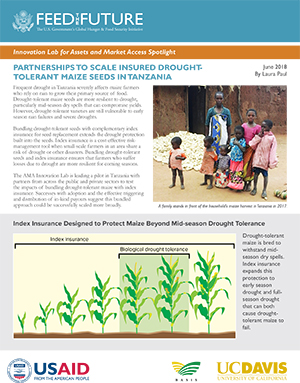
Frequent drought in Tanzania severely affects maize farmers who rely on rain to grow their primary source of food. Drought-tolerant maize seeds are more resilient to drought, particularly mid-season dry spells that can compromise yields. However, drought-tolerant varieties are still vulnerable to early season rain failures and severe droughts.
 Bundling drought-tolerant seeds with complementary index insurance for seed replacement extends the drought protection built into the seeds. Index insurance is a cost-effective risk-management tool when small-scale farmers in an area share a risk of drought or other disasters. Bundling drought-tolerant seeds and index insurance ensures that farmers who suffer losses due to drought are more resilient for coming seasons.
Bundling drought-tolerant seeds with complementary index insurance for seed replacement extends the drought protection built into the seeds. Index insurance is a cost-effective risk-management tool when small-scale farmers in an area share a risk of drought or other disasters. Bundling drought-tolerant seeds and index insurance ensures that farmers who suffer losses due to drought are more resilient for coming seasons.
The AMA Innovation Lab is leading a pilot in Tanzania with partners from across the public and private sectors to test the impacts of bundling drought-tolerant maize with index insurance. Successes with adoption and the effective triggering and distribution of in-kind payouts suggest this bundled approach could be successfully scaled more broadly.

Complementing Drought-tolerant Maize Seeds with Index Insurance
This AMA Innovation Lab pilot in Tanzania, part of broader work including a similar pilot in Mozambique, is in partnership with CIMMYT, UAP Insurance, the Tanzanian Agricultural Research Institutes (ARI), the District Agriculture and Irrigation Commissions (DAICO) and local seed companies.
The pilot seeks to raise food security and income stability by bundling index insurance with drought-tolerant hybrid maize. The insurance covers seed replacement, reducing the risk of buying improved seeds. Hybrids yield significantly more than traditional varieties but their cost and the risk they may still fail often act as barriers to adoption.
Bundling index insurance with drought-tolerant hybrid maize at the point of sale generates greater drought protection than the two technologies separately. Index insurance expands the biological protection within drought-tolerant seeds while the level of biological drought tolerance lowers the cost of the insurance.
The pilot in Tanzania has shown promising results with uptake and payouts. In 2016, 563 farmers across 30 villages bought the insured, drought-tolerant seeds. In the 2016-2017 season 2,001 packets (4,000 kg of seeds worth about US $8,000) were insured. That year, half of the villages received a payout due to early- and full-season drought. The network of seed vendors replaced 1,220 packets of seed as in-kind payouts.
Mobilizing Partnerships to Scale Drought Protection
These results from Tanzania are a credit to the effort and commitment of stakeholders from across the public and private sectors. After the research team calibrated the insurance to local weather patterns, UAP Insurance insured the seeds made available by the seed company partners. All sales were conducted through local Tanzanian seed agents who attended a training conducted in collaboration with the Tanzanian extension network, CIMMYT and the seed companies.

The broad benefits for successfully scaling this project can be significant. The product improves the income stability and food security of farmers—an objective of a nation’s agricultural sector and extension agencies. Seed companies have a higher-value product to help generate interest and sales. Insurance companies have the opportunity to break into the agricultural insurance sector or to expand their portfolios.
The biggest winners from successful collaboration are maize farmers who need better tools to manage their risk of drought. Farmers will also benefit from future interventions that could include index insurance to protect yields as well as replace seeds. These innovations will bring total coverage closer to comprehensive drought protection.
This report is made possible by the generous support of the American people through the United States Agency for International Development (USAID). The contents are the responsibility of the Feed the Future Innovation Lab for Assets and Market Access at UC Davis and do not necessarily reflect the views of USAID or the United States Government.
